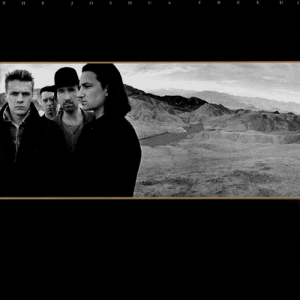
The Joshua Tree is the fifth studio album by Irish rock band U2. It was produced by Daniel Lanois and Brian Eno, and was released on 9 March 1987 by Island Records. In contrast to the ambient experimentation of their 1984 release, The Unforgettable Fire, the band aimed for a harder-hitting sound within the limitation of conventional song structures on The Joshua Tree. The album is influenced by American and Irish roots music, and through sociopolitically conscious lyrics embellished with spiritual imagery, it contrasts the group's antipathy for the "real America" with their fascination with the "mythical America".
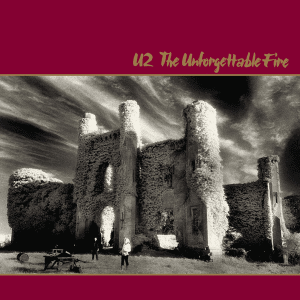
The Unforgettable Fire is the fourth studio album by Irish rock band U2. It was produced by Brian Eno and Daniel Lanois, and released on 1 October 1984 by Island Records. The band wanted to pursue a new musical direction following the harder-hitting rock of their previous album, War (1983). As a result, they employed Eno and Lanois to produce and assist in their experimentation with a more ambient sound. The resulting change in direction was at the time the band's most dramatic. The album's title is a reference to "The Unforgettable Fire", an art exhibit about the atomic bombing of Hiroshima.

"Stuck in a Moment You Can't Get Out Of" is a song by Irish rock band U2. It is the second track on their tenth studio album, All That You Can't Leave Behind (2000), and was released as the album's second single on 29 January 2001. The band's lead vocalist Bono has said the song was inspired by a fictional conversation with his friend Michael Hutchence about suicide. The song peaked at number 52 on the US Billboard Hot 100 and topped the charts in Canada, their native Irish Singles Chart, and Italy, while reaching the top 10 in Australia, Denmark, Finland, the Netherlands, Norway, Spain and on the United Kingdom Singles Chart. In 2002, the song won the Grammy Award for Best Pop Performance by a Duo or Group with Vocal at the 44th Annual Grammy Awards ceremony.
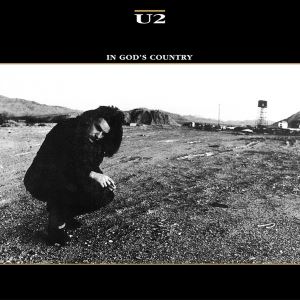
"In God's Country" is a song by the rock band U2. It is the seventh track from their fifth studio album The Joshua Tree and was released as the album's fourth single in November 1987 in North America only.

"With or Without You" is a song by Irish rock band U2. It is the third track on their fifth studio album, The Joshua Tree (1987), and was released as the album's lead single on 16 March 1987. The song was the group's most successful single at the time, becoming their first number-one hit in both the United States and Canada by topping the Billboard Hot 100 for three weeks and the RPM national singles chart for one week, with a further three weeks at number two.

"Beautiful Day" is a song by Irish rock band U2. It is the first track on their tenth studio album, All That You Can't Leave Behind (2000), and was released as the album's lead single on 9 October 2000. The song was a commercial success, helping launch the album to multi-platinum status, and is one of U2's biggest hits to date.

"I Still Haven't Found What I'm Looking For" is a song by Irish rock band U2. It is the second track from their 1987 album The Joshua Tree and was released as the album's second single in May 1987. The song was a hit, becoming the band's second consecutive number-one single on the US Billboard Hot 100 while peaking at number six on the UK Singles Chart.
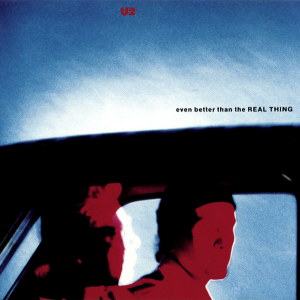
"Even Better Than the Real Thing" is a song by Irish rock band U2, and is the second track on their seventh album, Achtung Baby (1991). It was released as the album's fourth single on 8 June 1992, and it reached number three in Ireland and Canada while becoming a top-ten hit in Austria, New Zealand, and Sweden. A remixed version of the song released the same year peaked at number eight in the United Kingdom and number 10 in Ireland. In 1997, readers of Mojo named the song the 71st-best track of the 1990s.
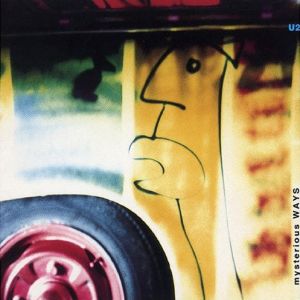
"Mysterious Ways" is a song by Irish rock band U2. It is the eighth track from their 1991 album, Achtung Baby, and was released as the album's second single on 2 December 1991, two weeks after the album. The song began as an improvisation called "Sick Puppy", with the band liking only the bass part that bassist Adam Clayton composed. The band struggled to build a song from it, with vocalist Bono and producer Daniel Lanois arguing intensely during one songwriting session. The song's breakthrough came after guitarist the Edge began experimenting with the Korg A3 effects unit. "Mysterious Ways" features a danceable beat, funky guitar hook, and conga-laden percussion, as well as mystical lyrics by Bono about romance and women.

"Pride (In the Name of Love)" is a song by Irish rock band U2. It is the second track on the band's 1984 album, The Unforgettable Fire, and was released as its lead single in September 1984. The song was produced by Brian Eno and Daniel Lanois. Written about the American civil rights leader Martin Luther King Jr., "Pride" received mixed critical reviews at the time, but it was a major commercial success for U2 and has since become one of their most popular songs, as well as being re-evaluated positively by many as one of the greatest songs of all time. It appeared on the band's compilation albums The Best of 1980–1990 and U218 Singles and was reworked and re-recorded for Songs of Surrender (2023).
"Bullet the Blue Sky" is a song by Irish rock band U2, and is the fourth track from their 1987 album The Joshua Tree. Lyrically, the song was inspired by a trip that lead vocalist Bono made to Nicaragua and El Salvador, where he saw firsthand how local peasants were affected by United States military intervention in the region. Angered by what he witnessed, Bono asked guitarist the Edge to "put El Salvador through an amplifier." "Bullet the Blue Sky" is one of the band's most overtly political songs, with live performances often being heavily critical of political conflicts and violence.

Robbie Robertson is the solo debut album by Canadian rock musician Robbie Robertson, released in 1987. Though Robertson had been a professional musician since the late 1950s, notably a founder of and primary songwriter for The Band, this was his first solo album. Robbie Robertson won the Juno Award for "Album of the Year", and producers Daniel Lanois and Robertson won the "Producer of the Year" Juno award, both in 1989; there were no Juno Awards in 1988.
"One Step Closer" is a song by Irish rock band U2, and is the ninth track on their 2004 studio album, How to Dismantle an Atomic Bomb.
"A Sort of Homecoming" is a song by Irish rock band U2, and is the opening track on their 1984 album, The Unforgettable Fire. A live version of the track is found on 1985's four-track EP, Wide Awake in America.

"The Ground Beneath Her Feet" is a song by Irish rock band U2. It appears in the 2000 film The Million Dollar Hotel, which was produced by U2 lead vocalist Bono, and the song was included on the film's soundtrack. Author Salman Rushdie is credited as the lyricist, as the words are taken from his 1999 book The Ground Beneath Her Feet. Written during the recording sessions for U2's album All That You Can't Leave Behind (2000), the song features Daniel Lanois, who played pedal steel guitar. A different mix from the soundtrack version appears in the film. "The Ground Beneath Her Feet" was released as a promotional single in February 2000, reaching number two on the US Billboard Adult Alternative Songs chart, number 22 in Canada, and number one in Iceland.

No Line on the Horizon is the twelfth studio album by Irish rock band U2. It was produced by Brian Eno, Daniel Lanois, and Steve Lillywhite, and was released on 27 February 2009. It was the band's first record since How to Dismantle an Atomic Bomb (2004), marking the longest gap between studio albums of their career to that point. The band originally intended to release the songs as two EPs, but later combined the material into a single record. Photographer Anton Corbijn shot a companion film, Linear, which was released alongside the album and included with several special editions.
"Wild Honey" is a song by the rock band U2. It is the seventh track on their 2000 album All That You Can't Leave Behind. The song was played eleven times during the Elevation Tour.
"Fez – Being Born" is a song by Irish rock band U2 and the eighth track on their 2009 album No Line on the Horizon. The group originally planned for the song to be sequenced as the opening track of the album, but they instead chose "No Line on the Horizon". During the recording sessions, "Fez – Being Born" had several different titles, including "Chromium Chords" and "Tripoli", and was the result of a fusion of two different songs.
"Moment of Surrender" is a song by rock band U2 and the third track on their 2009 album No Line on the Horizon. During the initial recording sessions for the album in 2007 in Fez, Morocco, the band wrote the song with producers Brian Eno and Daniel Lanois within a few hours. Together, they recorded the song in a single take; Eno called the song's recording "the most amazing studio experience [he's] ever had". According to him and Lanois, the track is the closest the band came to realising their original concept for the album of writing "future hymns". The seven-minute song features gospel-like vocals in the chorus, along with a predominantly organ- and piano-based musical accompaniment. Lyrically, the song is about a drug addict who is undergoing a crisis of faith.
"White as Snow" is a song by Irish rock band U2 and the ninth track on their 2009 album No Line on the Horizon. It was written from the perspective of a dying soldier serving in Afghanistan, and lasts the length of time it takes him to die. The track is based on the hymn "Veni, veni Emmanuel", and is the only political song on the album.












